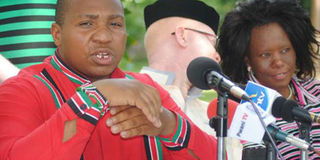Premium
Council wants probe into influx of foreign beggars

David ole Sankok (left), the chairman of the National Council for Persons with Disabilities in Kenya, with nominated Member of Parliament Isaac Mwaura and Migori Women Representative Dennita Ghati at Sarova Whitesands Beach Resort and Spa in Mombasa on May 31, 2016. PHOTO | LABAN WALLOGA | NATION MEDIA GROUP
What you need to know:
Council chairman David ole Sankok claimed a cartel was behind the influx, for commercial gain. According to Dr Sankok, there could be more than 10,000 disabled people who had been ferried in to beg on the streets.
The council has asked President Uhuru Kenyatta to initiate diplomatic talks with his Tanzanian counterpart John Pombe Magufuli on ways to get the group back to their country.
The National Council for Persons with Disabilities in Kenya has demanded an immediate probe into the influx of foreign beggars in Kenya.
The council said the rise in the number of beggars, especially from Tanzania, was a cause for concern.
Council chairman David ole Sankok claimed a cartel was behind the influx, for commercial gain. According to Dr Sankok, there could be more than 10,000 disabled people who had been ferried in to beg on the streets.
The council has asked President Uhuru Kenyatta to initiate diplomatic talks with his Tanzanian counterpart John Pombe Magufuli on ways to get the group back to their country.
“There must be someone organising the entry of these foreign beggars into most Kenyan town centres. It appears they are being dropped at specific positions very early in the morning and picked up late in the evening,” he said.
He said the hundreds of foreign beggars preyed on the kindness of Kenyans and were used by cartels to import vehicles duty free.
The organisation, he said, had established that the beggars slipped into Kenya through the border, aided by cartels, and flock to the towns, where they live with local beggars before finding their footing.
They then settle down in begging communes, renting adjacent houses in areas like Kariobangi, Korogocho, Huruma and Dandora in Nairobi.
Speaking to the Nation, Dr Sankok cited a recent incident in Nakuru Town where a Safaricom employee trended on social media after she was captured kneeling to assist a disabled person who is Tanzanian.
He called on the Ethics and Anti-Corruption Commission to also probe people who were using the disabled “to import vehicles duty-free”.
“There are cartels in the port of Mombasa who are allowing this corruption to happen and we want them investigated,” he said.





